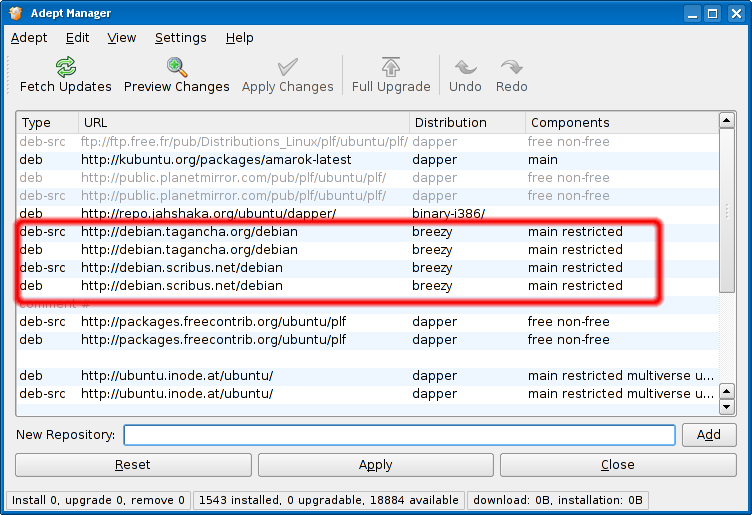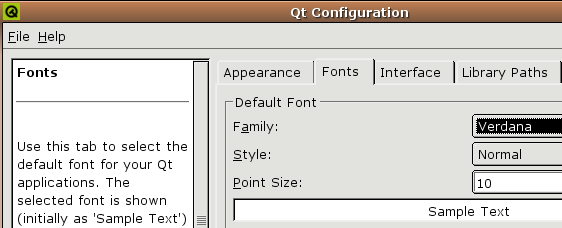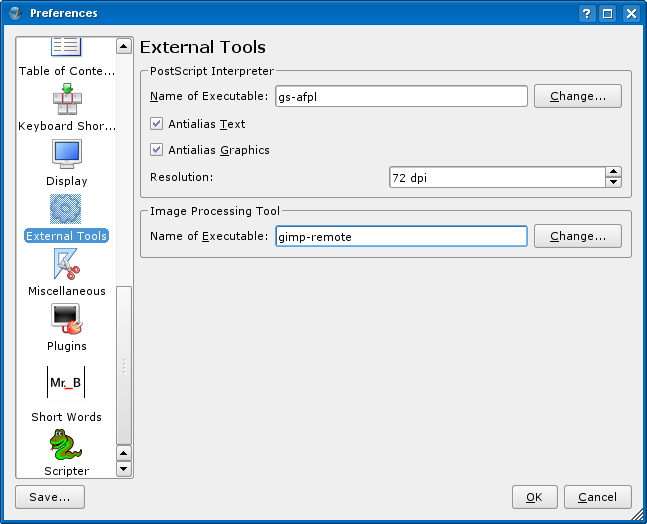Getting Scribus on Ubuntu/Kubuntu up and running: Difference between revisions
No edit summary |
No edit summary |
||
| Line 1: | Line 1: | ||
[[Category:Installation]] [[Category:EN]] [[Category:Linux]] | [[Category:Installation]] [[Category:EN]] [[Category:Linux]] | ||
'''Note:''' the main document maintained by the Debian/Ubuntu packager and other people is at [[Debian|located here]]. | |||
<div style="background-color: #fee; margin: 0 1em; padding: 0 10px; border: 1px dotted #c00;"> | <div style="background-color: #fee; margin: 0 1em; padding: 0 10px; border: 1px dotted #c00;"> | ||
Revision as of 03:56, 15 January 2011
Note: the main document maintained by the Debian/Ubuntu packager and other people is at located here.
BIG FAT WARNING: Scribus users on any version of Kubuntu from Dapper Drake on may experience difficulties while changing values in real number spinboxes. This is a long standing bug which has been reported to both Ubuntu and Scribus bug tracker. As long as there is no real solution, you can use of the workarounds mentioned in Ubuntu Bug Tracker, preferably remove the package scim_qtimm.
Please refer also to this metabug for other *buntu issues that may diminish its suitability as a good platform for Scribus and DTP
| Requirements: | |
| Operating System: | Ubuntu/Kubuntu Linux |
| Scribus Version: | 1.3.3.* and 1.3.* |
| DTP skills: | novice |
| OS skills: | novice |
Repositories are provided for the majority of Debian and Ubuntu based systems. If you are uncertain which distribution you are running the file /etc/lsb-release will probably contain that information.
| Vendor | Distribution | Available sets |
|---|---|---|
| Debian | sid | main contrib non-free |
| Debian | etch | main contrib non-free |
| Debian | lenny | main contrib non-free |
| Debian | sqeeze | main contrib non-free |
| Debian | stable | main contrib non-free |
| Debian | testing | main contrib non-free |
| Debian | unstable | main contrib non-free |
| Ubuntu | jaunty | main non-free |
| Ubuntu | intrepid | main non-free |
| Ubuntu | hardy | main non-free |
# debian.scribus.net - Primary repository deb http://debian.scribus.net/debian yourdistribution yoursets deb-src http://debian.scribus.net/debian yourdistribution yoursets
# debian.tagancha.org - Backup repository deb http://debian.tagancha.org/debian yourdistribution yoursets deb-src http://debian.tagancha.org/debian yourdistribution yoursets
Example for the current release of Ubuntu
If you are using the latest release of Ubuntu, your /etc/lsb-release should look similar to this:
DISTRIB_ID=Ubuntu DISTRIB_RELEASE=9.04 DISTRIB_CODENAME=jaunty DISTRIB_DESCRIPTION="Ubuntu 9.04"
Based on this information, using the primary site, the repositories you would add are:
deb http://debian.scribus.net/debian jaunty main non-free deb-src http://debian.scribus.net/debian jaunty main non-free
Kubuntu Graphical Example
An example of adding both repositories successfully to a system running breezy with Adept Manager.
- Go to KDE menu/System/Adept (Package Manager)
Ubuntu: System/Administration/Synaptic (Package Manager) - In Adept go to Adept/Manage Repositories
Ubuntu: in Synaptic go to Settings/Repositories/New - Add the following repositories one by one using the Add field and click on Apply:
Ubuntu: Fill the fields and use the OK button to add the following repositories:
Adding the repository key
Our repositories are cryptographically signed for added security. Add the gpg-keys for our repositories to avoid having to confirm your installation choice to the package manager each time you update a scribus or scribus-ng package.
On recent systems
As root:
# apt-key adv --recv-keys --keyserver subkeys.pgp.net EEF818CF
As a regular user:
$ sudo apt-key adv --recv-keys --keyserver subkeys.pgp.net EEF818CF
On older systems
As root:
# gpg --keyserver subkeys.pgp.net --recv-keys EEF818CF # gpg --armor --export EEF818CF | apt-key add -
As a regular user:
$ gpg --keyserver subkeys.pgp.net --recv-keys EEF818CF $ gpg --armor --export EEF818CF | sudo apt-key add -
Last update
The key was last changed in March 2007 by Alex (Malex).
Launch Adept (on Kubuntu) or Synaptic (on Ubuntu) and install the following packages:
- scribus – Scribus 1.3.3.x (stable branch) or
- scribus-ng – Scribus 1.3.x (development branch) scribus-ng package can be installed paralelly to the scribus package
- scribus-template – developer and user-contributed additional templates
- scribus-doc – Scribus 1.3.3.x documentation, which has to be provided as a separate package due to its non-free nature by the Debian Free Software Guidelines
- scribus-ng-doc – Scribus 1.3.x documentation, which has to be provided as a separate package due to its non-free nature by the Debian Free Software Guidelines
- icc-profiles – a collection of common ICC profiles to use with Scribus and other color profile-aware software
- lprof – hardware color profiler that can be used to create color profiles for your hardware to be used with Scribus
- qt3-qtconfig – Ubuntu users are strongly advised to install this package for finetuning the Scribus GUI with their Gnome desktop
- gs-afpl – The AFPL Ghostscript PostScript interpreter, the Ghostscript version recommended by the Scribus team
Optionally, install the following high quality font packages:
- t1-xfree86-nonfree
- ttf-bitstream-vera
- ttf-gentium
- ttf-xfree86-nonfree
Finetuning Scribus
Default GUI font (Ubuntu users only)
- Launch gtconfig: ALT + F2 / enter "qtconfig" / hit Enter
- Go to Fonts tab and choose the font family and size to match your Gnome settings
External tools and additional fonts
- Launch Scribus and go to File/Preferences/External Tools
- PostScript Interperter: enter gs-afpl
- Image Processing Tool: gimp-remote
- Go to Fonts subsection and add/disable/enable additional fonts
Other installation howtos
(c)
The content of this page is available under the Creative Commons Attribution-ShareAlike Licence and Free Documentation Licence
If you alter, transform, or build upon this work, you may distribute the resulting work either under one or under both of the abovementioned licences.


